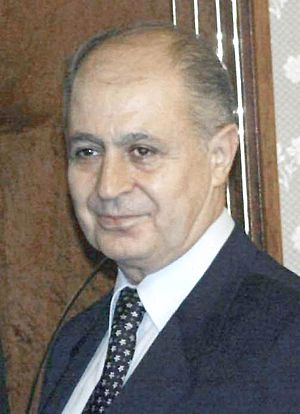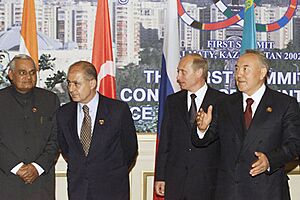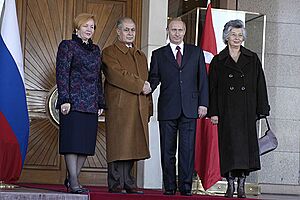Ahmet Necdet Sezer facts for kids
Quick facts for kids
Ahmet Necdet Sezer
|
|
|---|---|

Sezer in 2004
|
|
| 10th President of Turkey | |
| In office 16 May 2000 – 28 August 2007 |
|
| Prime Minister | |
| Preceded by | Süleyman Demirel |
| Succeeded by | Abdullah Gül |
| President of the Constitutional Court | |
| In office 6 January 1998 – 4 May 2000 |
|
| Preceded by | Yekta Güngör Özden |
| Succeeded by | Mustafa Bumin |
| Personal details | |
| Born | 13 September 1941 Afyonkarahisar, Turkey |
| Political party | Independent |
| Spouse | Semra Kürümoğlu |
| Children | 3 |
| Alma mater | Ankara University, Law School |
| Profession | Judge |
| Signature |  |
Ahmet Necdet Sezer (born 13 September 1941) is a Turkish statesman and judge. He served as the tenth president of Turkey from 2000 to 2007. Before becoming president, he was the head of Turkey's highest court, the Constitutional Court. The Turkish Parliament, called the Grand National Assembly of Turkey, chose Sezer as president in 2000. He took over after Süleyman Demirel's term ended. In 2007, Abdullah Gül became the next president.
After a long career as a judge, Sezer became a candidate for president. Many political parties in Parliament supported him. During his time as president, he strongly believed in keeping government and religion separate, which is called secularism. He thought this idea was very important for Turkey. In 2001, a disagreement between President Sezer and Prime Minister Bülent Ecevit led to a big economic problem in Turkey. This was partly because the government was not very strong and Turkey owed a lot of money to the International Monetary Fund.
In 2002, the Justice and Development Party (AKP) won a lot of votes in the general election. President Sezer often disagreed with this party. He stopped some laws they proposed and sent others to the Constitutional Court to be checked. This included laws about banks and allowing Recep Tayyip Erdoğan to be involved in politics again. President Sezer also did not allow women wearing headscarves to attend official events at the presidential palace. He believed this followed the laws about separating religion and government at that time. Because of this, the wives of Abdullah Gül and Recep Tayyip Erdoğan, Hayrünnisa Gül and Emine Erdoğan, could not attend these events.
Contents
Early Life and Education
Ahmet Necdet Sezer was born in Afyonkarahisar, Turkey. His parents, Ahmet Hamdi Sezer and Hatice Sezer, were Macedonian Turkish people who moved from Greece to Turkey. This happened after the Turkish War of Independence.
He finished high school in Afyonkarahisar in 1960. Then, he studied law at Ankara University and graduated in 1962. He started his career as a judge in Ankara. After serving in the military, he worked as a judge in different towns like Dicle and Yerköy. Later, he became a special judge in the High Court of Appeals. In 1978, he earned a master's degree in civil law from Ankara University.
Becoming a Top Judge
On March 8, 1983, Sezer was chosen to be a member of the High Court of Appeals. This is a very important court in Turkey. Later, on September 26, 1988, President Kenan Evren appointed him as a member of the Constitutional Court. This court makes sure that laws follow the country's constitution. He was appointed again in 1993.
On January 6, 1998, Ahmet Necdet Sezer was elected as the chief justice of the Constitutional Court. He was the main judge of this court until 2000. He left this job when he was elected as the president of Turkey.
President of Turkey (2000–2007)

Ahmet Necdet Sezer became president on May 16, 2000. He was the first president of Turkey to come from a background as a judge. His term was supposed to end on May 16, 2007. However, the Turkish Parliament could not choose a new president right away. So, he stayed in office until August 28, 2007, when Abdullah Gül was finally elected.
On February 21, 2001, President Sezer had a disagreement with Prime Minister Bülent Ecevit during a meeting. Some people believe this argument was a main reason for a big economic crisis that happened soon after. Others think the crisis was caused by Turkey trying to join the European Union and its financial agreements with the International Monetary Fund.
President Sezer strongly believed in keeping government and religion separate. This was often a point of disagreement between him and the ruling AKP. He often said that Turkey's secular system was in danger. He believed that the Islamic religion does not require women to wear headscarves. Because of this, he did not allow the wives of lawmakers who wore headscarves to attend official events at the Presidential Palace.
During his time as president, he pardoned 260 people who had been found guilty of crimes. Many of these were left-wing activists. Some groups criticized these pardons. However, Sezer also made laws stricter to punish people involved in terrorism.
After the Presidency
In the 2014 Turkish presidential election, which was won by Erdoğan, Sezer chose not to vote. He said he did not vote because there was no candidate who strongly supported secularism.
In the 2023 Turkish presidential election, Sezer supported Kemal Kılıçdaroğlu as a candidate.
Images for kids
See also
 In Spanish: Ahmet Necdet Sezer para niños
In Spanish: Ahmet Necdet Sezer para niños
 | Janet Taylor Pickett |
 | Synthia Saint James |
 | Howardena Pindell |
 | Faith Ringgold |





